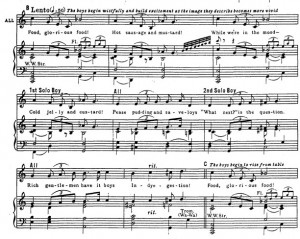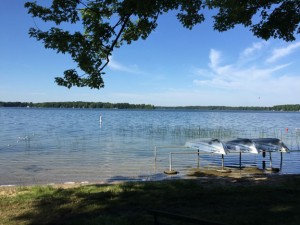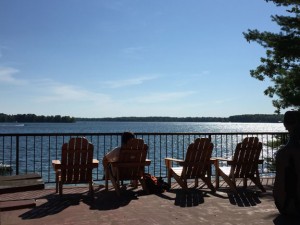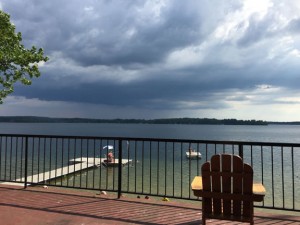 or What I took away from my summer at camp
or What I took away from my summer at camp
What did I love?
First and foremost: Being able to spend time with the Lovely Lady Leslie. I believe she was 15 when I first met her, and seeing the wonderful adult and mother and teacher she’s grown into fills me with delight. When I’m having a hard day, she cheerfully says just the right thing to help me through the hard to the fun on the other side. I loved popping into her studio/going out for dinner/going shopping/enjoying family time with her this summer. What a magnificent woman she is, and everyone who knows her agrees.
I loved getting to spend time with Tyler’s BFF since they met at camp in 1989. Chip was also a collaborative pianist, assigned to the dance studios. He calls me mom; I refer to him as my third son. And we got to see each other repeatedly for three weeks. A wonderful benefit to this summer!
I loved sitting by the water at any time of the day, watching the people around me socializing or just spending time with their own thoughts.
 I loved meeting incredibly talented and just plain nice people, learning about their lives, seeing how they’ve found success in life. I loved finding so many mutual connections in this world of the arts—people who knew friends of mine in Tucson and Washington and Cleveland. We live in a small, lovely world.
I loved meeting incredibly talented and just plain nice people, learning about their lives, seeing how they’ve found success in life. I loved finding so many mutual connections in this world of the arts—people who knew friends of mine in Tucson and Washington and Cleveland. We live in a small, lovely world.
I loved the flora and fauna that is northern Michigan. The endless forests. The wild turkeys by the side of the road. The morning and evening call of the loon. Peaceful.
What lessons did I learn?
Collaborative pianists should speak only when spoken to. Beyond that, keep your lips zipped. Only ask a question if you absolutely can’t figure out it.
 The score I was working on this summer—typeset in an older font, and being read from a distance of about 18 inches—was hard to read. I would be six or eight pages into the song and the director would say to the music director, “Let’s go back to ‘Pease pudding and saveloys.'” I would lean in to be closer to the print and try to quickly scan the pages and the words to find that phrase. Nightmarish! If I couldn’t find it, or couldn’t find it quickly enough, the music director would feel annoyed (she later told me), as she expected me to always be one step ahead of her and find the starting point without having to ask.
The score I was working on this summer—typeset in an older font, and being read from a distance of about 18 inches—was hard to read. I would be six or eight pages into the song and the director would say to the music director, “Let’s go back to ‘Pease pudding and saveloys.'” I would lean in to be closer to the print and try to quickly scan the pages and the words to find that phrase. Nightmarish! If I couldn’t find it, or couldn’t find it quickly enough, the music director would feel annoyed (she later told me), as she expected me to always be one step ahead of her and find the starting point without having to ask.
I learned I’m used to being visible, and I’m used to learning and perfecting all the notes and then playing them in performance with very few dropped notes. We first knew we would have a clarinetist in the pit. And my music director started telling me what notes not to play to allow for the clarinet. Then we found out we’d have a cello, and I was instructed to drop more notes. Then a violin was added. Then we started programming the Clavinova to be able to add some string sounds, and hurdy-gurdy sounds, and chimes, and harp. The instructions to me from my M.D. would come quickly while I was playing in rehearsal, and I’d try to remember them until we got to a stopping point so I could mark my music. When she would call something to me, there were children singing and feet stomping. I couldn’t hear or understand what she was saying. She’d give me “notes” after the rehearsal, and I’d mark them into my music. She’d tell me not to play a phrase and I’d mark my music, then the next day she would tell me to play it and I’d remark the music, then the following day she’d say to play it softly, under the clarinet, and I’d remark it again. My brain developed a constant state of confusion. If I played something wrong, I’d get a look. You know what I mean. And I’d start being afraid to strike the keys if I wasn’t absolutely certain of the notes I was to play. By the final performance she was giving that signal of [pointing index and middle fingers at your own eyes, then at the eyes of the person you’re giving the “I’m watching you” message to]. I just wanted to say … oh, never mind. If you know me well, you know what I wanted to say. And I wanted to throw my music on the ground and walk out. But I didn’t. I’m not that kind of person. I’m not a fool.
Back to the first sentence of that paragraph—I’m used to walking among the crowd after a performance and having audience members tell me how much they enjoyed my playing, my music. At these performances, the audience saw only the back of my head. The fact that I had known and worked with their kids the entire summer was nonexistent; no one knew who I was. I met one family at Maddy’s the day Jas and I had lunch there, and the mom asked if I had a family member in the show. No, I’m your sweet son’s accompanist.
So how to turn those two paragraphs into the learning experience? I learned I’m probably much better suited for a show that doesn’t have a pit orchestra. I had several discussions with one of the other intermediate division collaborative pianists. We joked about switching shows next summer—he’d take my production job and I’d take his workshop job. But that’s only if I go back, and right now “if” is a very big word.
And one more thing I learned, courtesy of my younger son: When you greet a performer after a show, don’t say, “You did a good job.” Of course they did a good job. Months of work went into that performance! Tell them you enjoyed their work or enjoyed the show. That’s what they did all the work to accomplish: your enjoyment.
What did I wish had happened differently?
 The extra work that was given to me the first day I was there caused me much angst. I was assigned to a production, not a workshop, not individual lessons. The production was a lot of work. My score was around 150 pages long. I had a good grasp of the songs before arriving at camp, but had all the incidental music to learn—scene change music, chase scenes, murder scenes. A whole lot of dots on the page. I was contracted for a 25-hour work week (meaning actually classroom time, not practice time on my own—that counted for much more time), and then suddenly given, on the first day of camp, an extra hour a day to accompany voice lessons. For the first three weeks of camp, I felt like I was rushing constantly. When my morning rehearsal got out at 11:50, I walked as quickly as I could from the north end of campus to the south end, stopping along the way in my dorm room to drop off my backpack and use the restroom before continuing to a basement studio under the dining hall to accompany two voice lessons. Then at 1:00 I would race upstairs, grab something to eat, wolf it down in 15 minutes, and then swing back through my dorm and lie down for ten minutes before grabbing my backpack again and racing back to the other end of campus to my 2:00 rehearsal. I felt I was racing all the time. Then the last day of week three, I woke up with a sore throat. I had caught the cold that all the kids were passing around. (I still have not recovered from it.) On Tuesday night of week four, I basically broke down. I called Leslie and dumped my problems into her ear, and she encouraged me to contact our collaborative piano scheduler and ask for help. After hanging up the phone, I did just that. The next morning, I sent a note to the voice teacher whose students I was accompanying, and told my music director how I was feeling. She wrote a note to the piano scheduler also, and within a couple of hours, I received a return email saying the problem would be solved by the end of day. Then a few hours later, the email came that they had found two pianists to replace me and I was off the hook. From the first day of camp until that day, twenty-two days, I had suffered seven migraine attacks. Can you say “stress?” (And from that day to today, I have suffered zero migraine attacks. Just sayin’.)
The extra work that was given to me the first day I was there caused me much angst. I was assigned to a production, not a workshop, not individual lessons. The production was a lot of work. My score was around 150 pages long. I had a good grasp of the songs before arriving at camp, but had all the incidental music to learn—scene change music, chase scenes, murder scenes. A whole lot of dots on the page. I was contracted for a 25-hour work week (meaning actually classroom time, not practice time on my own—that counted for much more time), and then suddenly given, on the first day of camp, an extra hour a day to accompany voice lessons. For the first three weeks of camp, I felt like I was rushing constantly. When my morning rehearsal got out at 11:50, I walked as quickly as I could from the north end of campus to the south end, stopping along the way in my dorm room to drop off my backpack and use the restroom before continuing to a basement studio under the dining hall to accompany two voice lessons. Then at 1:00 I would race upstairs, grab something to eat, wolf it down in 15 minutes, and then swing back through my dorm and lie down for ten minutes before grabbing my backpack again and racing back to the other end of campus to my 2:00 rehearsal. I felt I was racing all the time. Then the last day of week three, I woke up with a sore throat. I had caught the cold that all the kids were passing around. (I still have not recovered from it.) On Tuesday night of week four, I basically broke down. I called Leslie and dumped my problems into her ear, and she encouraged me to contact our collaborative piano scheduler and ask for help. After hanging up the phone, I did just that. The next morning, I sent a note to the voice teacher whose students I was accompanying, and told my music director how I was feeling. She wrote a note to the piano scheduler also, and within a couple of hours, I received a return email saying the problem would be solved by the end of day. Then a few hours later, the email came that they had found two pianists to replace me and I was off the hook. From the first day of camp until that day, twenty-two days, I had suffered seven migraine attacks. Can you say “stress?” (And from that day to today, I have suffered zero migraine attacks. Just sayin’.)
What else? My housing situation. I was placed in an adjoining room with a young man. When I got there, the door was unlocked and ajar. I was able to pull it shut with difficulty (the door had only a deadbolt, not a handle). The second day of camp the door was ajar and it was at that point that I realized my “suitemate” was a man. I went to the Stone Center and asked them to send someone to lock the door, which happened within an hour. But things degraded from there. He had an electric guitar and amp and would play his rather strange compositions, or spend an hour trying to pick out the tune to the Star-Spangled Banner. Then he started bringing an “unauthorized guest” into his room late at night. About four days into my cold when I most desparately needed a good night’s sleep, he brought her in at 1:30 a.m. and their amorous noises woke me from a sound sleep. I felt trapped in my own room. I’m thankful for a thoughtful and kind “dorm mom” who took care of things for me, as much as they could be taken care of when you’re dealing with a young person who cares only about his own wants and needs rather than the rules and guidelines.
What did I miss?
 Waking up with Jas by my side very morning. Having my cats around. Making the usual summer memories with our friends: watching the sun set across Lake Erie, post-golf dinners, Saturday nights out together at our favorite restaurants. Life. I know it was only six weeks, but at our age, one never knows how many more great memories remain to be made.
Waking up with Jas by my side very morning. Having my cats around. Making the usual summer memories with our friends: watching the sun set across Lake Erie, post-golf dinners, Saturday nights out together at our favorite restaurants. Life. I know it was only six weeks, but at our age, one never knows how many more great memories remain to be made.
The parallel stories
As my work experience degraded and I felt more and more incompetent, I was whisked back to the summer of 1971, when I was studying harmony with Nadia Boulanger in Fontainebleau, France. Before that, I had always been a big fish in a small pond. I went to small parochial schools through my first (hated) year of college. I was the best pianist I knew. I had never met another person with perfect pitch. I was always the star of any music theory class. Then I got to Fontainebleau. We took a solfège exam to see where we would be placed. There were five solfège classes; I placed in the top class, number one. There was a number zero class, the people who knew solfège so well they didn’t have to take the class any more. Everyone in class one had perfect pitch.
Mlle. Boulanger was a daunting presence. I was in tears one day before and two days after my weekly lesson with her. Like my law school experience twenty-five years later, studying with Mlle. Boulanger was one of the hardest things and one of the best things I ever did. To this day I use the harmony principles I learned in my studies with Boulanger. I’ll play a chord progression in accompanying a vocalist, then realize the tenor voice should have gone down a third rather than up a step. And I’m 21 again and not as dumb as I thought I was.
This summer gave me the same feelings, forty-four years later. The more I was corrected, the more I was given the stinkeye when dropping a note or not making the transition to a different voice quickly enough, the more incompetent I felt. I had days when I fought to hold back my tears until I could get out of the classroom.
When I got home from Fontainebleau in September of 1971, I didn’t know what to do with myself. I didn’t want to go back to college for fear of reinforcing my incompetence. I was engaged to a man I didn’t really like, but my mother had told me I’d never get a man because I was too obstinate, and this man had proposed, so surely he would be the only man ever to do so. (And in the South, we knew the only goal we had was to marry and have kids.) I had been working as a staff accompanist at Walt Disney World, but they had decided to import entertainers from California rather than hire locally, so I had no full-time job waiting for me there. So I just decided to get married. Two weeks later. And two weeks after that I knew I had made the biggest mistake of my life, and stuck with it for ten long, miserable years. Because that’s what we do.
As I sat on the piano bench in rehearsals, falling deeper and deeper into the mire of my inadequacies, all I could think was when I got home, I was going to retire from everything except my editing job. Just chuck it all. And never go back to Interlochen. Because I wasn’t good enough.
 I felt the irony of the situation. Along with many other people, I have always said Interlochen was a place where kids who didn’t fit in at home came and could fit in together in their differentness. And here I was, feeling like I didn’t fit in. In the place where all misfits were normal. I couldn’t make it all compute in my brain.
I felt the irony of the situation. Along with many other people, I have always said Interlochen was a place where kids who didn’t fit in at home came and could fit in together in their differentness. And here I was, feeling like I didn’t fit in. In the place where all misfits were normal. I couldn’t make it all compute in my brain.
The first half of this year was very difficult for me because of a lot of family stuff that was going on, and I thought I was escaping to Interlochen to do what I love to do—play for musical theatre productions. And yet the difficulties continued, and I started wondering if all of 2015 was going to be in the toilet.
I’m home now. I’m sitting in my comfortable bed as I type this. My fat cat is lying on the foot of my bed, snoring. My scaredy cat is getting used to my presence and starting to let me pet him again. When Jas’s alarm went off at 5:00, I didn’t know where I was or what day it was. In a few minutes I’ll get up, shower, dress, run errands, do laundry, finish unpacking. Life will start again. I’ll try to refind my center and go on.
That summer sure didn’t turn out the way I thought it would. It had hours of being the best summer of my life, and days of being the worst summer of my life.
Would I do it again? In my optimism, probably.
But for right now, I’m glad it’s over and I’m glad to be home.


